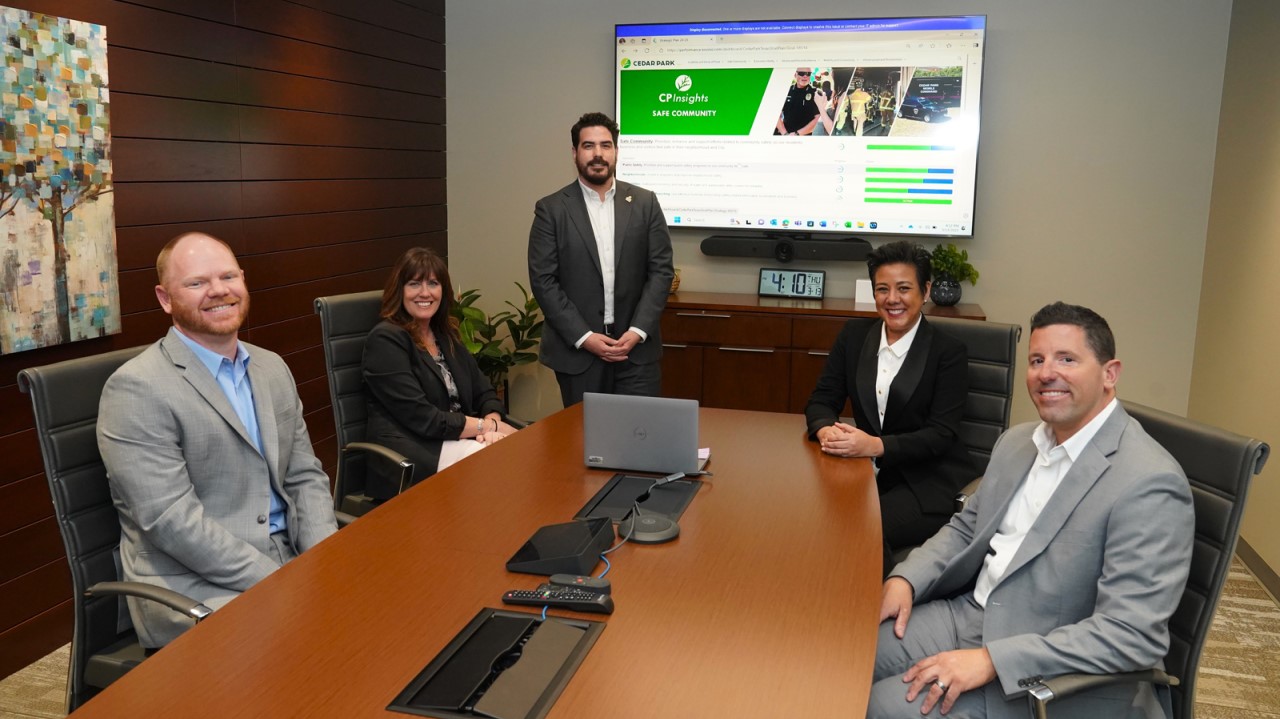
The role of an ICMA Local Government Management Fellow presents a unique challenge: stepping into a new organization, quickly understanding its operations and initiatives, and making a tangible impact within a limited timeframe.
As a fellow, I was tasked with creating the first-ever public dashboard for the city of Cedar Park, Texas, to communicate organizational performance and progress on priorities outlined in the strategic plan. This was an entirely new experience for me, but my success in this initiative boiled down to two key factors: (1) securing a champion and executive buy-in, and (2) building strong relationships.
The Importance of Having a Champion and Executive Buy-In
Having a champion—someone in a leadership role who understands the value of your project and ensures it remains a priority—is essential when starting any new initiative. My champion was one of the city’s assistant city managers. Together, we outlined the project scope, identified priorities, and strategized on how best to advocate for the initiative. When you’re new to an organization and spearheading a project, your champion will be instrumental in helping you navigate internal politics and ensuring support from staff.
With leadership’s support, the dashboard project gained legitimacy and encouraged participation from departments. Without executive sponsorship, efforts to standardize data collection or streamline reporting could have received resistance and stalled. Securing early support from senior leadership provided me with the authority needed to be successful, bring departments together, and ensure that quarterly updates were submitted on time.
The Importance of Discovery Meetings
Another crucial step in integrating into an organization is learning how it operates. For my public dashboard project, discovery meetings with department heads and frontline staff provided invaluable insights into the city’s strategic priorities and the key performance indicators that mattered most.
When I began, I relied heavily on department heads, as they were the subject matter experts. Through these meetings, I discovered that before this project, quarterly strategic goal and capital project updates were tracked on an Excel spreadsheet with inconsistent levels of detail. Updates required constant follow-ups and reminders as deadlines approached. While the dashboard was designed for public transparency, one of the biggest internal benefits of these discovery meetings was recognizing the need to streamline the city’s reporting process.
In some cases, critical information—such as accomplishments, roadblocks, or next steps—was missing, and late updates were common. From the start, I sought to understand existing workflows and update procedures while providing departments with an opportunity to contribute to process improvements. Thankfully, they were eager to collaborate and saw the value in making their jobs easier.
By engaging with department heads and staff early, I was able to map out update efforts, identify gaps, and highlight information more clearly and transparently. More importantly, these meetings helped establish relationships and trust, making it easier to navigate challenges later when I needed information. Without this foundational step, the dashboard project could have easily become just another version of the old Excel spreadsheet.
Collaborating with Other Departments
Each department has its own methods for tracking performance data and reporting progress. Consolidating this information into a centralized system requires consistent communication and cooperation. Build upon the relationships and connections you developed during the discovery meetings. By engaging directly with department heads and staff, I was able to bridge gaps between siloed data sources, get insight into their workflow, and develop a more comprehensive view of citywide performance.
Collaboration also allowed departments to see the broader impact of their work beyond their individual areas and how it fits into wider city initiatives. For instance, the parks and recreation department’s strategic initiatives directly influenced those of the engineering and capital projects department. By integrating information across departments through a public dashboard, we created a more holistic approach to performance management that better reflected the interconnected nature of city services.
Additionally, working together provided an opportunity to build a shared sense of ownership over the dashboard. Rather than seeing it as a top-down reporting tool, departments viewed it as a resource that could improve their own decision-making processes and internal tracking. This buy-in was essential for maintaining engagement and ensuring that updates remained timely and accurate.
Lessons for Future Fellows
For Local Government Management fellows and others embarking on similar projects, here are a few key takeaways from my experience.
1. Secure a champion and executive buy-in.
What you do at an organization as a fellow is important. If leadership gives you a project, you need to gain their support of your approach to ensure your project has legitimacy in the eyes of staff and fosters department participation.
2. Invest in discovery meetings.
Building relationships and understanding organizational priorities early on lays the foundation for success. Talking with department heads and staff allowed me to get to know them and their roles, which gave me the best insight into what was important to them as I slowly began to understand processes in the organization.
3. Ensure alignment with strategic goals.
A dashboard should not just collect data—it should tell a compelling story that reflects the city’s mission and objectives. Lean on your project champion and department heads to better understand their needs and help you find the alignment with your project and how it connects to the broader organizational goals.
4. Showcase internal value.
While public-facing dashboards are important for transparency, their biggest impact often lies in improving internal reporting and decision-making. Sell staff on how you are helping to make their job easier.
With this approach even a Local Government Management fellow can drive meaningful improvements in an organization. The experience of building a public dashboard reinforced the importance of patience, persistence, and adaptability—skills that will serve me well in any future local government role.
ICMA’s Local Government Management Fellowship
The Local Government Management Fellowship (LGMF) is a highly competitive career development opportunity that places fellows in full-time local government management-track positions shaped by direct mentorship under senior government leaders and rotational assignments. Fellows are given the opportunity to assume real responsibility, thrive in an environment that recognizes potential, and gain unique exposure to local government. Finalists are selected based on academic performance, demonstrated leadership potential, commitment to public service, communication skills, initiative, creativity, and positive attitude. Finalists then interview for 12-month fellowship appointments at local governments across the United States.
The LGMF continues to provide a groundbreaking career entry opportunity for fellows and provide communities with impactful change. Over the past 20 years, the program has generated 425 fellows, more than 35 who have taken on a chief or assistant chief administrative officer role, and alums who have continued a mentorship cycle through hosting fellows.
Eligibility Requirements
To be eligible to participate in the Local Government Management Fellowship, an applicant must:
- Be a recent graduate or student enrolled in a public administration, public policy, or related field master’s degree program.
- Satisfy all of the requirements for their degree program by August 31 of the year of the fellowship.
- Have no formal local government management work experience.
- Be eligible to work in the United States.
- Complete the LGMF application by the closing date.
Salary and Benefits Packages
Salary and benefits packages for fellows vary based on a number of factors and are determined by the host city. Both will be discussed with fellows at the end of the interview process, if they are to be offered a position with the host city.
ICMA Benefits
Those individuals placed in an LGMF host community receive:
- Complimentary ICMA membership for two years.
- Complimentary registration to the ICMA Annual Conference.
- Scholarship funds to support travel and registration to an ICMA Local Government Reimagined Conference.
- Complimentary access to ICMA’s Management Assessment.
- Complimentary subscription to PM Magazine.

CHANCE WOOD served as a 2024-2025 Local Government Management Fellow for Cedar Park, Texas, USA. Following the fellowship, he accepted a permanent role as a utility analyst for the Cedar Park Department of Public Works.
New, Reduced Membership Dues
A new, reduced dues rate is available for CAOs/ACAOs, along with additional discounts for those in smaller communities, has been implemented. Learn more and be sure to join or renew today!
